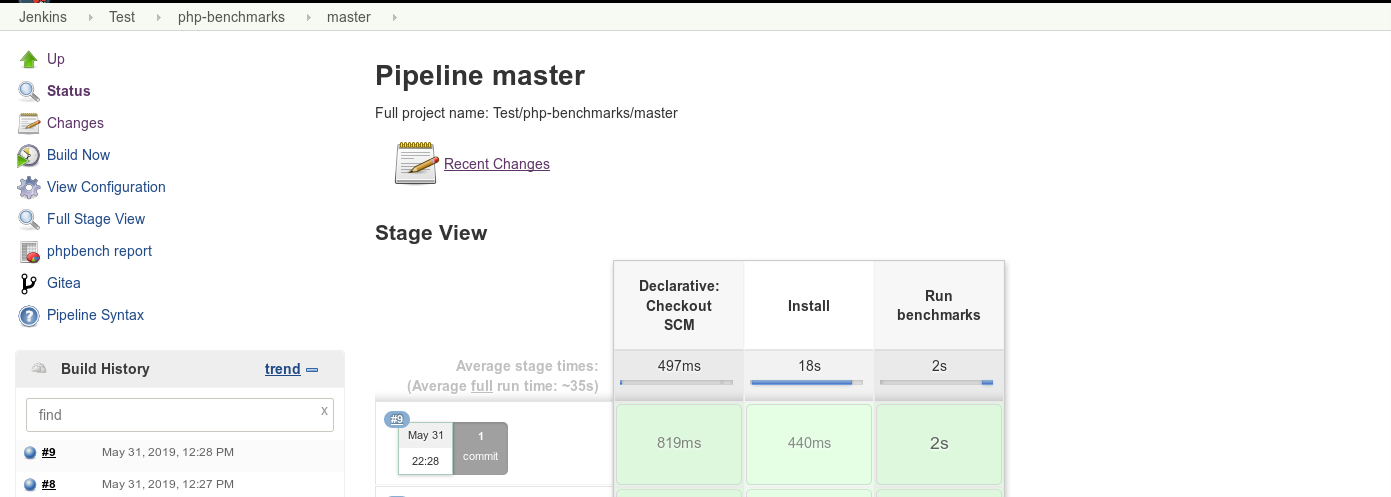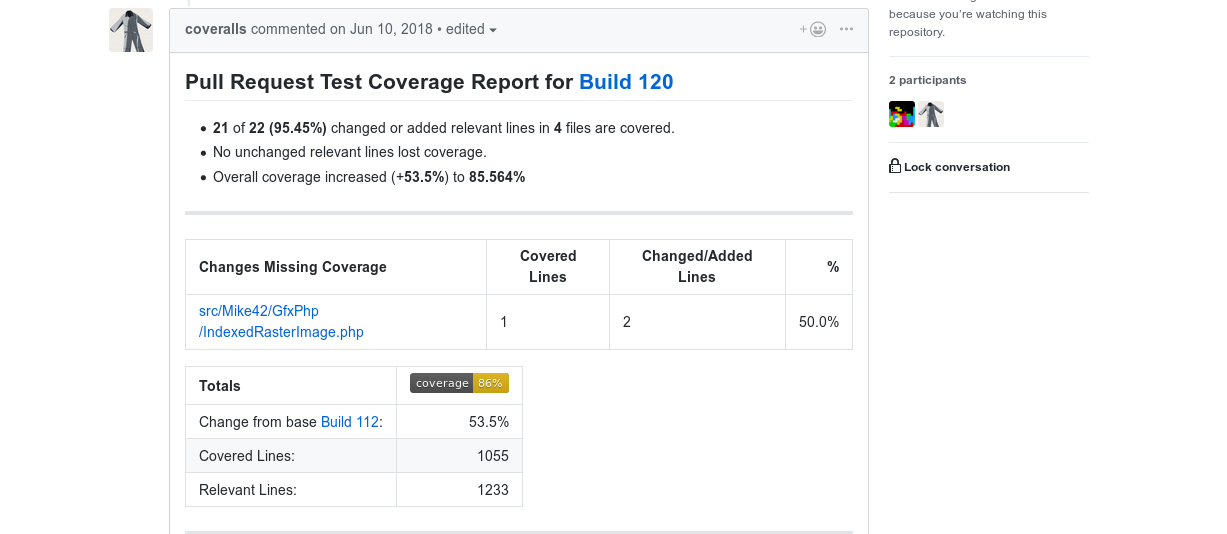This blog post is all about measuring the speed of PHP code through micro-benchmarks.

Why micro-benchmarks
I think of micro-benchmarks as a complement to tests. A well-written test would give a developer a definite pass or fail result, while well-written micro-benchmark will give the developer an indication of the duration of an operation.
To put it another way, tests can help you find out whether the code is behaving correctly, while micro-benchmarks can help you to track whether your changes are making the code faster or slower.
Make sure that your code is doing real processing work before you spend time on this: Algorithms such as sorting, compressing, or parsing are good candidates. My guess is that most of the code in a regular PHP application would not benefit significantly from having a suite of benchmarks, because web apps tend to be I/O bound (eg database, network and disk access).
Introducing PhpBench
I have previously written a standalone test script every time I’ve needed to measure the speed of something in PHP. This works up to a point, but it gets quite hard to maintain as the number of benchmarks increases.
PhpBench is one of the available tools for running micro-benchmarks from PHP, and there are a few reasons why I think it’s worth a try:
- it’s actively maintained
- it installs with
composer - it runs in a similar way to PHPUnit, so the benchmarks are fully specified in PHP code and run with a PHP tool.
- it implements familiar concepts that you would find in benchmarking tools from other languages (eg. JMH from the Java world).
Installation
Start out with a blank composer project.
$ composer init
Add some auto-loading settings to composer.yml that PHP knows to find ExampleApp classes in the src folder.
{
"name": "mike42/php-benchmark-examples",
"description": "Example PHP benchmark project",
"type": "project",
"license": "MIT",
"minimum-stability": "dev",
"require": {},
"require-dev": {},
"autoload": {
"psr-4": {
"ExampleApp\\": "src"
}
}
}
At this point, install the phpbench dev version.
$ composer require --dev phpbench/phpbench:@dev
./composer.json has been updated
Loading composer repositories with package information
Updating dependencies (including require-dev)
Package operations: 22 installs, 0 updates, 0 removals
- Installing symfony/process (4.4.x-dev 1a42849): Cloning 1a42849a7f from cache
- Installing symfony/options-resolver (4.4.x-dev 94cbb72): Cloning 94cbb72bb9 from cache
- Installing symfony/finder (4.4.x-dev 1b5ec12): Cloning 1b5ec12340 from cache
- Installing symfony/polyfill-ctype (dev-master 82ebae0): Cloning 82ebae0220 from cache
- Installing symfony/filesystem (4.4.x-dev 5914824): Cloning 59148241f7 from cache
- Installing psr/log (dev-master c4421fc): Cloning c4421fcac1 from cache
- Installing symfony/debug (4.4.x-dev 8278839): Cloning 8278839457 from cache
- Installing symfony/service-contracts (dev-master 0c81a04): Cloning 0c81a04f68 from cache
- Installing symfony/polyfill-php73 (dev-master d1fb4ab): Cloning d1fb4abcc0 from cache
- Installing symfony/polyfill-mbstring (dev-master fe5e94c): Cloning fe5e94c604 from cache
- Installing symfony/console (4.4.x-dev e2fe100): Cloning e2fe1002fd from cache
- Installing lstrojny/functional-php (1.9.0): Loading from cache
- Installing beberlei/assert (v3.x-dev ce139b6): Cloning ce139b6bf8 from cache
- Installing seld/jsonlint (1.7.1): Loading from cache
- Installing psr/container (dev-master 014d250): Cloning 014d250dae from cache
- Installing phpbench/container (1.2): Loading from cache
- Installing webmozart/assert (1.4.0): Loading from cache
- Installing webmozart/path-util (dev-master 95a8f7a): Cloning 95a8f7ad15 from cache
- Installing phpbench/dom (0.2.0): Loading from cache
- Installing doctrine/lexer (dev-master ee614dd): Cloning ee614dd93a from cache
- Installing doctrine/annotations (1.7.x-dev 3f35255): Cloning 3f35255290 from cache
- Installing phpbench/phpbench (dev-master dccc67d): Cloning dccc67dd52 from cache
symfony/service-contracts suggests installing symfony/service-implementation
symfony/console suggests installing symfony/event-dispatcher
symfony/console suggests installing symfony/lock
Writing lock file
Generating autoload files
Writing a benchmark
Add some code to src/ExampleThing.php to measure.
<?php
namespace ExampleApp;
class ExampleThing {
/**
* Inefficiently multiply numbers together
*/
public function multiply(int $x, int $y) : int {
$ret = 0;
for($i = 0; $i < $x; $i++) {
for($j = 0; $j < $y; $j++) {
$ret++;
}
}
return $ret;
}
}
Write a benchmark for the code in benchmarks/ExampleThingBenchmark.php
<?php
use ExampleApp\ExampleThing;
/**
* @BeforeMethods({"init"})
* @Revs(1000)
* @Iterations(5)
*/
class ExampleThingBenchmark {
private static $exampleThing;
public function init()
{
self::$exampleThing = new ExampleThing();
}
/**
* @Subject
*/
public function doMultiply()
{
self::$exampleThing -> multiply(100, 100);
}
}
Before you run anything, you will also need a configuration file. Add this minimal configuration to phpbench.json.dist.
{
"php_disable_ini": true,
"bootstrap": "vendor/autoload.php",
"path": "benchmark",
"php_config": {
"extension": [ "json.so" ]
},
"time_unit": "milliseconds"
}
Running the benchmark
The most basic way to run all benchmarks at once is phpbench run, which looks like this:
$ php vendor/bin/phpbench run
PhpBench @git_tag@. Running benchmarks.
Using configuration file: /home/mike/workspace/blog/phpbench/php-benchmarks/phpbench.json.dist
\ExampleThingBenchmark
doMultiply..............................I4 [μ Mo]/r: 0.232 0.232 (ms) [μSD μRSD]/r: 0.000ms 0.10%
1 subjects, 5 iterations, 1,000 revs, 0 rejects, 0 failures, 0 warnings
(best [mean mode] worst) = 0.232 [0.232 0.232] 0.233 (ms)
⅀T: 1.162ms μSD/r 0.000ms μRSD/r: 0.100%
As you might expect, there are options to run specific benchmarks, or to present the results in different ways. However, there were some PhpBench-specific things which you will need to navigate to use it successfully.
Firstly, there are two different output settings to consider:
reportoptions allow you to decide which data to print in a table.outputoptions allow you to decide how to format it for output
I also found it useful to add --progress=none to suppress the text displayed by default, since you will otherwise get broken HTML output.
Lastly, be aware that confusingly, the default report is not active by default. Specify it to get a table listing out each iteration.
$ php vendor/bin/phpbench run --progress=none --report=default
suite: 13415431dc0db41c12decee0fa83c26d1db0f678, date: 2019-05-31, stime: 22:01:34
+-----------------------+------------+-----+------+------+----------+-----------+--------------+----------------+
| benchmark | subject | set | revs | iter | mem_peak | time_rev | comp_z_value | comp_deviation |
+-----------------------+------------+-----+------+------+----------+-----------+--------------+----------------+
| ExampleThingBenchmark | doMultiply | 0 | 1000 | 0 | 915,736b | 236.716μs | +1.68σ | +1.08% |
| ExampleThingBenchmark | doMultiply | 0 | 1000 | 1 | 915,736b | 231.999μs | -1.45σ | -0.93% |
| ExampleThingBenchmark | doMultiply | 0 | 1000 | 2 | 915,736b | 233.960μs | -0.15σ | -0.1% |
| ExampleThingBenchmark | doMultiply | 0 | 1000 | 3 | 915,736b | 233.878μs | -0.2σ | -0.13% |
| ExampleThingBenchmark | doMultiply | 0 | 1000 | 4 | 915,736b | 234.361μs | +0.12σ | +0.08% |
+-----------------------+------------+-----+------+------+----------+-----------+--------------+----------------+
The type of report that I found most useful is aggregate, since it provides a summary of each iteration.
$ php vendor/bin/phpbench run --progress=none --report=aggregate
suite: 1341543c02ebee4031d165665c2724c379bf9c98, date: 2019-05-31, stime: 22:01:18
+-----------------------+------------+-----+------+-----+----------+-----------+-----------+-----------+-----------+---------+--------+-------+
| benchmark | subject | set | revs | its | mem_peak | best | mean | mode | worst | stdev | rstdev | diff |
+-----------------------+------------+-----+------+-----+----------+-----------+-----------+-----------+-----------+---------+--------+-------+
| ExampleThingBenchmark | doMultiply | 0 | 1000 | 5 | 915,736b | 231.907μs | 232.614μs | 232.089μs | 233.538μs | 0.713μs | 0.31% | 1.00x |
+-----------------------+------------+-----+------+-----+----------+-----------+-----------+-----------+-----------+---------+--------+-------+
Both of the example above use console output, which is the default.
HTML reports
To capture phpbench output from a CI environment, you can generate a HTML report as well. Add an output section to phpbench.json.dist.
{
...
"outputs": {
"html_file": {
"extends": "html",
"file": "benchmarks.html",
"title": "Example benchmark report"
}
}
}
This new html_file output can be used with --output=html_file
$ php vendor/bin/phpbench run \
--progress=none --report=aggregate \
--output=console --output=html_file
From Jenkins
This is a Jenkinsfile that I use to run benchmarks. You need to install the “HTML Publisher” and “AnsiColor” Jenkins plugins.
pipeline {
agent any
stages {
stage('Install') {
steps {
ansiColor('xterm') {
sh 'composer install'
}
}
}
stage('Run benchmarks') {
steps {
ansiColor('xterm') {
sh 'php vendor/bin/phpbench run --progress=none --report aggregate --output=console --output=html_file --ansi'
publishHTML([
allowMissing: false,
alwaysLinkToLastBuild: true,
keepAll: true,
reportDir: '',
reportFiles: 'benchmarks.html',
reportName:
'phpbench report',
reportTitles: ''
])
}
}
}
}
}
Each build is then benchmarked, and the results are available as a link on the left.

The console output of the build shows the results.

To actually view the HTML report you will need to apply this tweak.

Next steps
I’ve started to add phpbench micro-benchmarks to some PHP projects that I work on, and I’m finding it a lot more useful than standalone test scripts.
The next step would be to integrate micro-benchmarks better into the development process. For example, I can already review code coverage improvements/regressions of a change on GitHub using Coveralls, which posts a comment to each pull request. This saves you from merging changes which don’t meet your project’s standards.

As far as I can tell, you would need to write custom code for more expressive phpbench reports along these lines, such as:
- the history of a benchmark over time, or
- the most-changed benchmarks against a baseline
phpbench does provide the building-blocks though, since you can set some options to archive the results of each run to a folder.